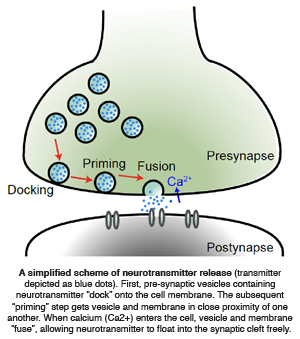
Marieke Meijer, PhD student at Functional Genomics, publishes in The EMBO Journal.
Munc-18 is a protein with a profound role in neurotransmitter release. The current study elucidates on its underlying molecular mechanisms of action.
Results are published in the March 27th issue of The EMBO Journal, in collaboration with the group of Dirk Fasshauer from Göttingen. The paper accompanies the completion of Marieke Meijer’s PhD-project.
Neurotransmitter Release
The release of neurotransmitter by neurons is an intricate process. First, proteins attached to neurotransmitter containing vesicles need to bind to proteins on the cell membrane. This causes vesicles to “dock‚ (see figure). Subsequent mechanistic action of proteins, so-called “priming‚, brings the vesicle and membrane in close proximity of one another. When Calcium enters the cell, the vesicle and membrane fuse. This allows neurotransmitter to float in to the synaptic cleft freely (see figure).
 Munc-18’s moment of action
Munc-18’s moment of action
Munc18 is essential to neurotransmitter release – Delete Munc18-1 from a neuron and neurotransmitter release is put on hold entirely. The exact mechanism(s) for this is unknown. Munc18-1 has an established role in docking vesicles onto the cell membrane, yet there is evidence for an additional, elusive role for the protein later on in the release process. An hypothesis in the field was for Munc-18 to drive the eventual fusion of vesicle and cell membrane (see figure). Marieke Meijer and colleagues now found this not to be the case.
Meyer investigated the effects of several mutated forms of Munc-18 on transmitter release. It showed that Munc-18’s elusive function takes place before fusion of vesicle and cell membrane. This suggests a role in the “priming‚ of the vesicle and renders Munc-18 dispensable for eventual fusion with the cell membrane.
There is still much to unravel on Munc-18’s exact function in the pre-synapse. The department of Functional Genomics continues to do so with multiple Munc-18 studies currently running.
Text by Kevin Janssen